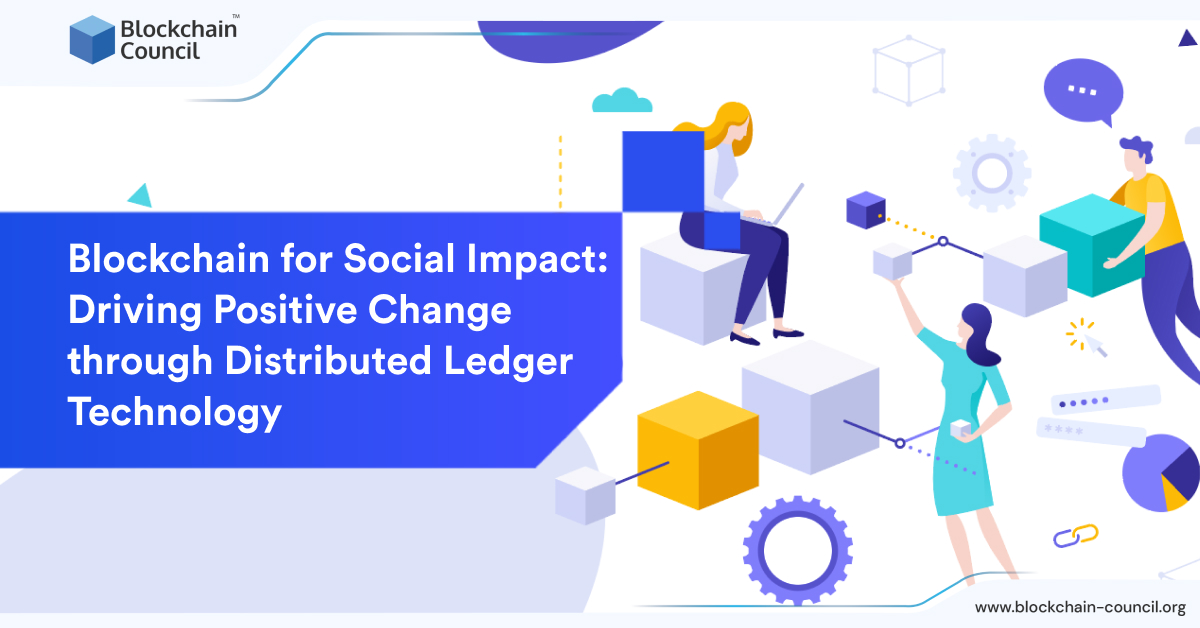
- Blockchain Council
- July 18, 2023
Blockchain technology has revolutionized industries by introducing decentralized and transparent systems. Beyond its commercial applications, blockchain is also driving positive change and making a significant impact in addressing societal challenges.
Understanding Blockchain for Social Impact
The basic concepts of decentralization, transparency, immutability, and security in blockchain technology offer a perfect platform for tackling social issues. By leveraging these characteristics, blockchain enables innovative solutions that empower individuals, enhance collaboration, and drive positive change in areas such as identity management, humanitarian aid, voting systems, and sustainable supply chains.
Identity Management Change
Many social and economic activities require effective identity management, yet this is still a problem for millions of people globally. Identity verification on the blockchain is safe and decentralized, giving users authority over their personal data. Individuals may safely store and exchange their credentials using blockchain-based identification systems, protecting privacy and lowering the danger of identity theft. This technology has the ability to increase access to necessary services, give underprivileged communities more power, and encourage financial inclusion.
Increasing Charity and Humanitarian Aid
By enhancing transparency, accountability, and efficiency in the charitable sector, blockchain technology has the potential to revolutionize humanitarian relief and philanthropy. Organizations may trace the flow of money by using blockchain-based systems, ensuring that donations get to the right people and are utilized for the right things. Blockchain can also make direct peer-to-peer donating possible, doing away with middlemen and cutting down on transaction costs. In particular, during times of crisis, smart contracts may automate the delivery of help, delivering timely and precise support to people in need.
Voting systems that are transparent and secure
Elections with blockchain-based voting systems have the potential to be safe, open, and impenetrable. Blockchain technology may be used to prevent voter fraud, guarantee the validity of the voting process, and raise public confidence in democratic institutions. The blockchain may be used to keep immutable records of votes, promoting openness and allowing for independent audits. Additionally, blockchain-based voting systems can improve accessibility for marginalized and remote communities, encouraging diversity and citizen engagement.
Sustainability in Supply Chains and Blockchain
In today’s global supply chains, sustainability and ethical sourcing are crucial factors to take into account. Blockchain technology has the potential to be significant in fostering ethical sourcing, fair labor standards, and environmentally friendly production while providing openness and accountability in supply chains. By documenting and verifying the origin and movement of goods, blockchain assists businesses in reaching sustainability goals and helps customers make informed decisions. Blockchain also makes it simpler to trace items, which reduces the likelihood of bogus goods and improves customer safety.
The Function of Service-Based Non-Custodial Wallets
Non-custodial wallet as a service simplifies the technical challenges of wallet management, making blockchain more accessible to a wider audience, and assisting businesses in creating wallets. These services provide flexible usage across many blockchains, approachable user interfaces, and seamless social impact application integration.
Non-Custodial Wallets in Social Impact Projects: Benefits
With non-custodial wallets, users have complete control over their digital assets and private keys, lowering the danger of theft and unwanted access. This element is crucial when dealing with sensitive personal data and money transactions in social impact programs.
- User-Friendly Experience: By offering user-friendly interfaces and expedited onboarding processes, non-custodial WaaS solutions make it easier for users to interact with blockchain networks and employ social impact apps. The simplicity of this strategy encourages more acceptance and participation.
- Interoperability and Accessibility: People can access a range of social impact initiatives since non-custodial wallets are designed to interact with many blockchain protocols. By supporting many blockchain networks, this interoperability guarantees easy integration with already-existing apps and encourages inclusion.
To showcase the real-world application of blockchain for social impact, this section presents case studies highlighting successful projects. Examples include supply chain transparency projects in the fashion sector, transparent contribution tracking systems, and blockchain-based platforms for identity management in refugee camps.
Challenges and Future Directions
Despite the immense societal effect that blockchain technology has the potential to have, there are a number of problems that need to be fixed. Among these include user acceptability, scalability, energy efficiency, governmental frameworks, and others. To get over these challenges and make the most of the technology’s advantages, cooperation between blockchain developers, social impact groups, governments, and regulatory agencies is crucial. Continuous research and development activities are also required to improve the usability, scalability, and energy efficiency of blockchain technologies.
Conclusion
Blockchain technology is an effective instrument for fostering progress and tackling societal issues. Blockchain allows creative solutions in identity management, humanitarian relief, voting systems, and sustainable supply chains by encouraging openness, trust, and accountability. Additionally, non-custodial wallets as a service are essential for enabling safe and convenient access to blockchain networks, encouraging their widespread adoption and involvement in social impact projects. We can anticipate many more significant developments and constructive shifts as blockchain continues to develop and mature, empowering people and communities everywhere.
































































 Guides
Guides News
News Blockchain
Blockchain Cryptocurrency
& Digital Assets
Cryptocurrency
& Digital Assets Web3
Web3 Metaverse & NFTs
Metaverse & NFTs
